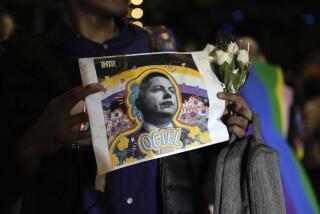Mexican Judge Is Found Shot to Death : Crime: Jurist had refused to jail officials from bus drivers union. Two others involved in controversial transit case have died violently.
MEXICO CITY — Abraham Polo Uscanga, an appeals court judge who had developed a reputation for independence, was murdered early Tuesday, police said.
Missing since Monday, when he failed to appear for lunch, he was found shot in the back of the neck in his son’s office on a major avenue in the capital, according to City Atty. Jose Antonio Gonzalez Fernandez.
Forensic tests showed that Polo Uscanga, 60, was killed by the .38-caliber revolver found beside his body and that he had not fired the gun himself, Gonzalez Fernandez said.
The slaying of Polo Uscanga was the third violent death associated with the controversial April bankruptcy of the “Route 100” metropolitan bus service.
The judge had told a radio interviewer earlier this month that he had resisted pressure to rule in favor of prosecutors in high-profile cases, including Route 100.
His accusations were devastating because an independent judiciary is integral to President Ernesto Zedillo’s vow to establish law and order in this nation of 85 million people.
After announcing Polo Uscanga’s death on his popular morning drive-time show, Jose Gutierrez Vivo, the commentator who had interviewed him, added: “I do not understand what is happening in this country.”
In the interview two weeks ago, Polo Uscanga said, “The problem is the interference of the executive power in [the decisions of] the judiciary.”
The judge went on to say that he had defied orders from Mexico City’s appeals court president, Saturnino Aguero, to hold for trial eight people accused of bombing a capital shopping center in a show of support for the 1994 Indian uprising in the southernmost state of Chiapas. Polo Uscanga ruled that there was not enough evidence to hold them.
He received a message from Aguero, he said, “that I had no political sensitivity, that I was not institutional.”
In a separate case, he said he and two other judges on the appeals panel had refused to hold two people for trial, even though Aguero allegedly told him that then-Finance Minister Pedro Aspe wanted them jailed.
The judge who wrote the opinion was not reconfirmed when his term expired, Polo Uscanga said.
After allegedly refusing Aguero’s demand that he overturn a lower court ruling so that police could issue arrest warrants for leaders of the metropolitan bus drivers union, Polo Uscanga requested a leave of absence in March. Another judge issued the ruling, and the union leaders were arrested.
Aguero was cleared of wrongdoing by a judicial review committee.
In an emotional statement on Tuesday, Aguero offered to cooperate with police “to clear my good name from slander.”
Besides casting an unwelcome spotlight on the Mexican judiciary, Polo Uscanga’s death also revives speculation about the collapse of the Route 100 metropolitan bus system, which critics have said is corrupt.
Members of the bus drivers union, one of the few significant organized labor movements not controlled by this nation’s ruling party, have violently protested the government-declared bankruptcy and the arrest of union leaders, who were involved in leftist causes that included organizing marches to support the Zapatista National Liberation Army, a guerrilla movement in Chiapas.
A special prosecutor investigating suspected fraud in the case was killed in an ambush outside his home in southern Mexico City on Sunday.
And Municipal Transport Secretary Luis Miguel Moreno was found dead on April 10, two days after city officials declared the bus line bankrupt and arrested leaders of the drivers union, on the orders of the other judge.
Moreno’s death was ruled a suicide, but many analysts remain unconvinced that he could have shot himself twice in the chest.
More to Read
Sign up for Essential California
The most important California stories and recommendations in your inbox every morning.
You may occasionally receive promotional content from the Los Angeles Times.










